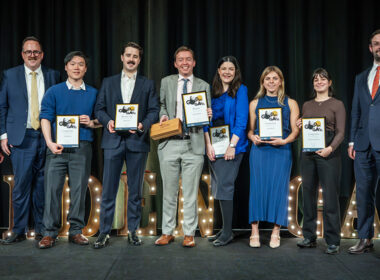In a groundbreaking move, the Law Society of NSW has introduced a new program to assist older Australians and their caregivers in identifying solicitors with expertise in Elder Law. This initiative is the first of its kind in Australia and addresses the growing need for specialised legal advice on complex legal problems as the population ages.
The Elder Law Program was officially unveiled today by Jacqueline Dawson, Chair of the Law Society’s Specialist Accreditation Board, at this year’s Specialist Accreditation Conference before several key figures involved in providing justice for older individuals.
Dawson noted in her opening address that Elder Law is the first new area of law added to the Law Society’s Specialist Accreditation scheme since 2009 and emphasised the distinction between Wills and Estates and Elder Law, highlighting the latter’s focus on legal issues individuals face as they age.
She said solicitors who achieve Specialist Accreditation in Elder Law will have demonstrated a high level of competence in relevant areas, reassuring clients seeking expert advice.
Brett McGrath, Law Society of NSW President, said the program’s introduction meets an expanding demand for expert legal advice in Elder Law, and the need for “a program that recognises advanced expertise in Elder Law will help lead to more just outcomes in these complex matters.”
This development is particularly crucial given the alarming statistics on elder abuse. One in six older Australians report experiencing elder abuse annually, and reports to the NSW Ageing and Disability Commission have risen sharply. The program will help older Australians access qualified legal professionals who can effectively navigate sensitive issues like elder abuse, accommodation concerns, enduring appointments, and applications to the NSW Civil and Administrative Tribunal (NCAT).
A collaborative approach
The Law Society of NSW will manage the program, which is open to eligible solicitors across Australia. McGrath said this collaborative approach is expected to result in a national network of Elder Law experts, covering jurisdictions representing 85 per cent of the Australian population.
“I am thrilled that our counterpart organisations in multiple jurisdictions have indicated that they will recommend their interested members participate in the Law Society’s program,” McGrath said.
“The Law Society is grateful for the support expressed for the new area of Accreditation from important stakeholders, ranging from community-based organisations delivering free legal help to older Australians up to the Australian Attorney General Mark Dreyfus KC.”
Dreyfus said the Australian Government is committed to ensuring that older Australians can enjoy longer, fulfilling lives, free from abuse.
“By setting the standard of a ‘specially competent practitioner’ the Law Society is helping older Australians facing complex legal issues to get the support, and the help they deserve when they seek expert advice from an Accredited Specialist in Elder Law,” Dreyfus said.
The initiative has also garnered support from the NSW Commission for Ageing and Disability, the NSW Trustee and Guardian, and NCAT.
Kathryn McKenzie, NSW Ageing and Disability Commission Acting Commissioner, stated abuse, neglect and exploitation of older people often occur in the context of complex family and personal situations, with the older person unsure of their legal rights.
“The introduction of the Specialist Accreditation program of Elder Law appropriately recognises this growing issue and the challenging and critical legal issues older people experience. We welcome the accreditation as an important step to ensuring access to expert services that can help uphold the legal rights of older people,” McKenzie said.
Applications to NCAT concerning substituted decision-making also extend to individuals who might have difficulty making decisions for themselves, including those with intellectual disabilities.
Anne Britton, NCAT Deputy President, said the initiative recognises the increasingly complex nature of this expanding area of law, which is now governed by multiple state and commonwealth statutes and congratulated the Law Society on establishing a specialist accreditation program in Elder Law.
“The needs of older Australians are varied, and this program recognises the important distinction between specialisation in wills and estates and Elder Law,” Britton said.
“The new area of specialisation will enable older clients to access high-quality legal services on complex legal issues that arise as they age.”
A call for practitioners to contribute
The Law Society encourages experienced Elder Law practitioners to contribute to developing the peer-assessed program, which will be launched in 2026. The program will uphold rigorous standards to ensure clients receive advice from recognised experts.
While recognising the need for specialised expertise, Dawson also assured older Australians that it wouldn’t necessarily lead to increased legal costs. She encouraged Elder Law practitioners who provided free legal services to participate in the program, ensuring access to advanced legal expertise for vulnerable older individuals.
“We will gather the brightest legal minds already practising in Elder Law to design and deliver this new area of accreditation. Those who undertake the Program will be challenged on their knowledge of the law and their client interaction,” Dawson said.
“The rigorous standard applied by assessors ensures that when a client sees a Specialist Accreditation logo, they can be assured they’re obtaining advice from a recognised expert in their field.”
Solicitor members of the Law Society are eligible to participate in the Specialist Accreditation Program if they have been in practice for at least five years and have dedicated at least 25 per cent of their practice to their chosen area of law for the previous three years. Both periods include full-time equivalence.
Once accredited, specialist practitioners must demonstrate yearly that their chosen area of law continues to account for at least 25 per cent of their work and must complete an additional ten units of continuing professional development relevant to their area of specialty.




